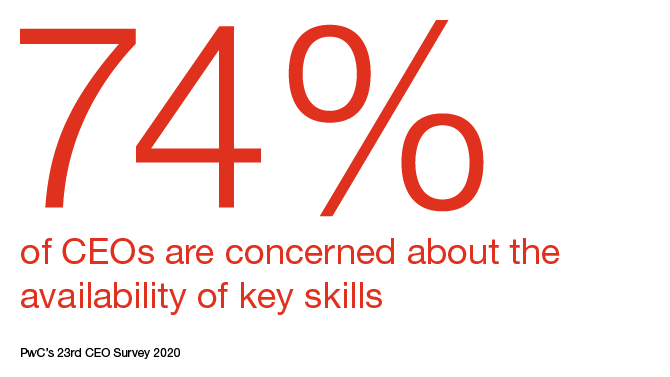{{item.title}}
{{item.text}}

{{item.text}}

Upskilling the workforce to bridge the digital divide is a complex problem that requires business leaders, governments and educators to work together to make the world a more resilient, more capable and more inclusive place.
Automation, data analysis, artificial intelligence (AI) and other emerging technologies can deliver productivity. But technology is only as good as the leaders who identify its opportunities, the technologists who deliver it and the people who work with it every day. That’s where some companies are coming up short: the right mix of skilled and adaptable people, aligned to the right culture and with the right mindset and behaviours can help power their business.
Many leaders are finding that their existing upskilling efforts are not fit for purpose: programmes don’t deliver the return on investment (ROI) organisations want or the change they need. It’s a problem that should be solved urgently.
Employers who make good-faith efforts to upskill their people build trust - and that in turn can enhance the organisation’s reputation in a world where trust is an increasingly valuable commodity. Business leaders are in the spotlight.
In this short documentary, academics, NGOs, policymakers and business leaders explain why upskilling for a digital world has become a priority for society, organisations and governments. We’re at an inflection point — we need to act now, collectively, to tackle this major, global issue before we risk excluding great swathes of society from the workplace.
Duration | 12:18s
In a rapidly changing environment - driven by demographic and technological global megatrends - organisations are shifting their approach to business strategy from reactive, deterministic approaches, to proactive directional strategies that build on the capability within the organisation. A clear, measurable and executable people strategy is quickly becoming a key differentiator in this fast paced digital age. The shift requires a rethink of people strategies to deliver on strategic intent – and improved alignment of the internal capabilities and people infrastructure to achieve competitive advantage and deliver on the challenges that the next decade will bring.
Three-quarters of CEOs taking part in PwC’s 23rd Annual Global CEO Survey responded that a lack of availability of the right skills is a concern. When the survey was conducted, from September to October 2019, pre-COVID-19, their worry was around how that would constrain growth. Today that same lack of the right- skilled and adaptable people could hamper their ability to tackle the impacts of the pandemic.
The survey also found that those organisations focused on expanding their employees’ skills, and therefore further along on the upskilling curve, were ahead of their peers in many ways and were more confident in their future.
Read more from PwC' Talent Trends 2020 report, Upskilling: Building confidence in an uncertain world.
“There is an upskilling dividend benefitting companies as they face an uncertain economy. Retaining the right talented people and enhancing their skills can help them survive today’s challenges and drives competitive advantage in the future.”
{{item.text}}

{{item.text}}
{{item.text}}

{{item.text}}



